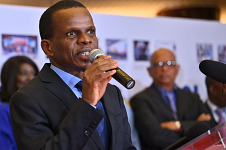The United Nations Economic Commission for Africa, (ECA) Acting Executive Secretary, Antonio Pedro, has called for the forging of strong partnerships and innovative strategies to tap new opportunities in the wake of economic and environmental crises affecting African countries.
Opening the three-day ECA Expo at the United Nations Conference Center in Addis Ababa today, Mr. Pedro said with technological advancement and digitalization of the economy, it was clear during the pandemic that the crisis ‘was a low hanging fruit for regional integration and for harnessing the demographic dividend on the continent’.
This year’s ECA Expo, the first one of its kind, is showcasing the work of the ECA with a view to forging new partnerships and strengthening existing ones to enable the Commission to serve its member countries effectively in a rapidly changing and complex environment.
In addition, the Expo is celebrating ECA’s achievements in the past 3 years while identifying potential areas of synergy where the ECA can leverage to improve efficiency and effectiveness in its strategic areas of focus.
Mr. Pedro invited stakeholders to provide feedback on the ECA areas of work and those that require improvement for the Commission to deliver on ‘client-focused services that respond to the complexity and dynamism of the environment’.
The ECA Expo showcases diverse products—tangible and intangible—from divisions and Sub-Regional Offices. On display among others will be innovative financing mechanisms to bridge the climate finance gap and fiscal and monetary policy reforms to respond to the tightening fiscal space and address debt vulnerability.
“I am confident that the exhibitors will provide participants with the necessary details on their achievements, best practices, and challenges to enable them to identify areas requiring strengthened collaboration and further improvement so that no one on the continent is left behind,” Mr. Pedro said, reiterating that “This is a must attend event for both internal and external partners, because the benefits of participating in the event are enumerable.”
Conceding that Africa was that the world, in general and the African continent in particular, was facing new and complex challenges and opportunities as reflected in the impacts of climate change geopolitical tensions with ramifications in food and energy crises, Mr. Pedro said innovation was needed to manage the challenges.
He said COP27 presented new investment opportunities on the continent to create carbon credit markets, deploy renewable energy and find solutions to the energy transition for the rest of the world. At the same time Covid 19 demonstrated opportunities in Africa to participate in the development of the pharmaceutical value chain, for instance.
The African Continental Free Trade Area (AfCFTA) agreement which he described as Africa’s Marshall Plan, will ensure seamless operation of new vehicles to make trade and investments within the continent and the global market.
“This calls for us to redefine what is our value proposition, what is ECA’s strategic role on the continent?” asked Mr. Pedro, noting that the role of the ECA needs to evolve as challenges multiply and that it can offer solutions to help Africa and member states achieve the Sustainable Development Goals and Agenda 2063.
He noted that the complexity and dynamism of the opportunities and challenges facing the continent present a further challenge for decision makers tasked with formulating strategies and policies that effectively address interconnected and interdependent problems.
“We need to acknowledge that the continents demands are increasingly becoming complex in nature and will require new sets of skills and forms of partnership,” said Mr. Pedro, calling for the creation of a fit for purpose ECA.
The UN 2.0 Quintet for Change underscores the need for a paradigm shift in the ways of doing things to be able to meet our clients’ needs in the 21st Century, he said noting that the value of future thinking and foresight programmes as long-term planning tools in strategic policy making, have become critical, particularly in the development context of ECA member States.
“We need to be cognizant of the dynamism in the financial landscape brought about by financial liberalization, technological changes, and market innovation, which require a new set of skills beyond the traditional macroeconomic modeling,” the Executive Secretary observed, adding that:
“We must embrace innovative and disruptive thinking to provide practical solutions to real life challenges affecting our member States now and, in the future.”
Mr. Pedro pointed out that the ECA was aware of cross-cutting issues that require interdependency and collective responsibility having discussed them in the on-going Accountability and Programme Performance Review Meetings (APPRM).

